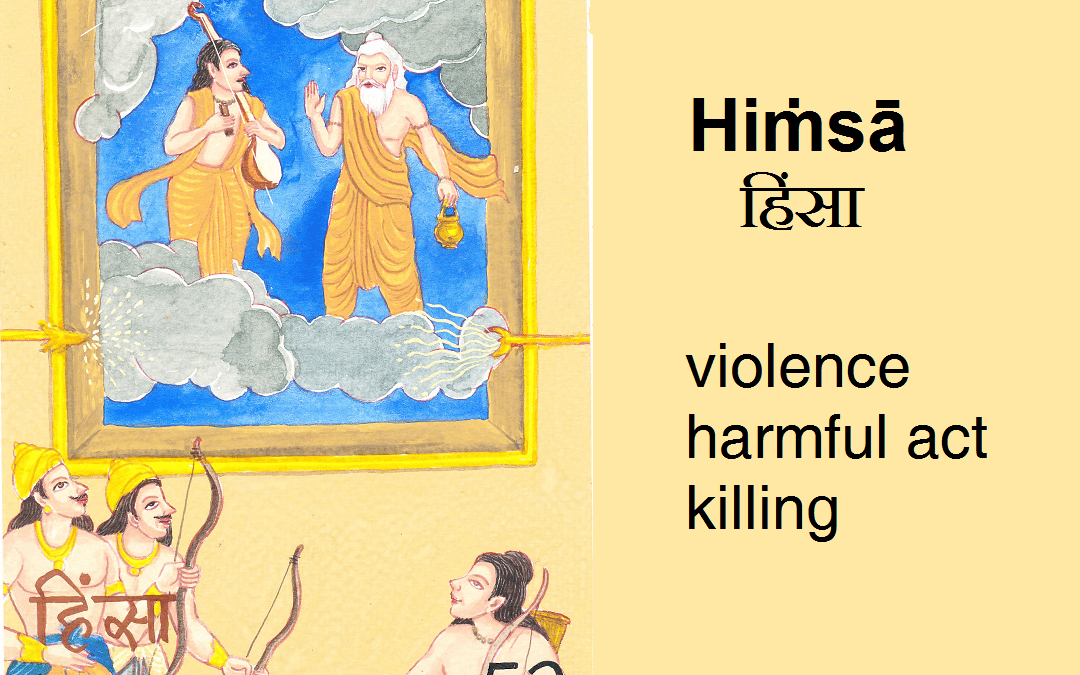Meaning violence Behaviour involving physical force intended to hurt, damage, or kill someone or something. brutality Great cruelty. ferocity The state or quality of being ferocious.
Interpretation “HiṁsāViolence, Harmful act, Killing”(violence) is a cell that draws the player down to “naraka” (hell). Why would an evolved being be vulnerable to engaging with violence?
Justifying Violence Well, Harish Johari believed this to be the result of the knowledge that “nothing really dies”, so why why not eliminate the beings on the wrong path so as to allow them another attempt at liberation. He attributes “jihād” to such reasoning.
Along these lines I am reminded of Oppenheimer’s quote from the Bhagvat Gita as he saw the fireball of the ‘Trinity Test’ of the Manhattan project – kālo ’smi loka-kṣaya-kṛt pravṛddho lokān samāhartum iha pravṛttaḥ ṛte ’pi tvāḿ na bhaviṣyanti sarve ye ’vasthitāḥ praty-anīkeṣu yodhāḥ – srimad bhagvat geeta 11.32 I am the mighty world destroying Time, now engaged in destroying the worlds. Even without You, none of the warriors arrayed in hostile armies shall live.
tasmāttvamuttiṣhṭha yaśho labhasva jitvā śhatrūn bhuṅkṣhva rājyaṁ samṛiddham mayaivaite nihatāḥ pūrvam eva nimitta-mātraṁ bhava savya-sāchin srimad bhagvat geeta 11.33
Therefore, stand up, and obtain fame. Conquer the enemies and enjoy the flourishing kingdom. Verily by Myself they have already been slain; be you a mere instrument, O left-handed archer.
If these are all justifications of violence then why does an unconditional snake lead the player down to purgatory? A good point to debate upon, and I invite you to interact on this very current and pertinent aspect of our society today! Please share your thoughts in your comments and let us attempt to understand terrorism and violence better.
I personally feel that a player who has not landed on gyān, subudhi, or viveka, has still not realised the mithyā of duality, and has not identified herself with her inner-self. Such a player would also experience a lot of power and supremacy at this stage. Austerities (tapaloka – cell 50) generate a lot of energy in the individual and make her vulnerable to violence. The plane of Prithvi (cell 51), “a living planet”, is a place for “survival of the fittest” and makes the player vulnerable to engage in violence. An experience of ones psychic energies also instills a feeling of power and supremacy, make her vulnerable to hiṁsā.
What is considered hiṁsā? Any act so as to alter, forcibly, in a conscious or unconscious manner, with a motive to hurt, is hiṁsā. The act can be an intent, a thought, speech or a deed. If that act “hurts” another, in any way, it is hiṁsā. The player must experience naraka (purgatory – cell 35) as penance and cleansing of his self, and continue again on her karmic journey.
Story Himsa is a Sanskrit word that means violence or harm. It is often used in reference to physical violence, but it can also refer to more subtle forms of violence, such as verbal abuse or emotional cruelty.
The concept of himsa has a long history in Indian Vedic thought. The earliest references to himsa are found in the Rig Veda, the oldest scriptures of Hinduism. In these texts, himsa is often seen as a negative force that can lead to suffering and destruction.
In the later Vedic texts, himsa comes to be seen as a more complex concept. It is acknowledged that there are some situations in which violence may be necessary, such as in self-defense or in the defense of others. However, it is also emphasized that violence should always be a last resort, and that it should be used with great caution.
The concept of himsa continues to be important in Hindu philosophy and practice. It is seen as a fundamental principle of dharma, or right conduct. Hindus are taught to avoid violence whenever possible, and to seek peaceful solutions to conflict.
On the game board Himsa is a Sanskrit word that means violence or harm. It is one of the five yamas, or restraints, in yoga. In the context of Ludo snake and ladder, Himsa can be seen as the opposite of ahimsa, or non-violence. The snakes on the Ludo board represent obstacles that we face in our lives, and some of these obstacles are caused by violence or harm.

Recent Comments